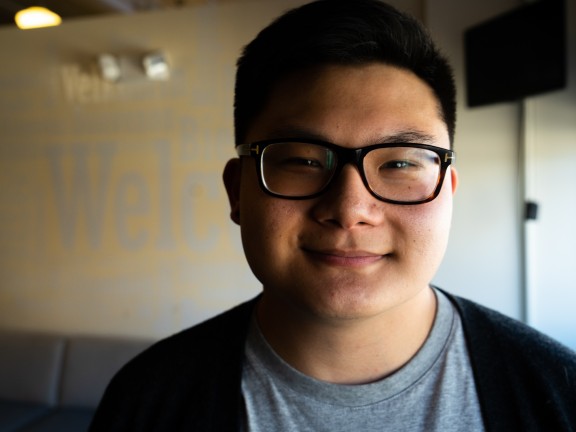Intern Highlight: Jay Choi

In order to highlight the vital work, energy, and perspective that our internship program brings to NSC, communications staff interviewed current interns and volunteers. Read below for a Q and A with Jay Choi, an intern with the employment team.
Where are you from? Are you currently in school? Where/what are you studying?
I am from Irvine, California which is a suburb in Orange County, Southern California. I am currently in school at Penn studying PPE (Philosophy, Politics, and Economics).
Tell us about yourself and how you got connected with the Nationalities Service Center?
I just happened upon NSC – one of my good friends was working here a couple summers ago as an ESL teacher. I was looking for somewhere to work and she recommended NSC and told me how rewarding and fun it was. So, I decided to apply and fortunately got to the interview and was able to meet Tiffany and Nasr, whose energy and brightness really convinced me to choose NSC.
Briefly describe your internship with NSC’s Employment Team, including your day-to-day tasks, responsibilities, and assignments.
My day-to-day tasks can look very different and you really have to be willing to wear many different hats while working here. Officially, I’m responsible for keeping track of employment retention, creating resumes and cover letters, completing job applications with clients, escorting them to interviews, and generally helping out Tiffany and Nasr with any tasks they have. But this can change depending on what the organization’s needs are and I’ve done anything from constructing a file cabinet to writing grant proposals.
What are some of the challenges you face in your day-to-day work?
I think coming from the standpoint of a work-study student who is not able to come in every day, it can be difficult to play catch-up. It can feel like you’re missing so much of not only what goes on in the office (what tasks that were on hold got completed and what still needs to be done), but what developments have occurred in clients’ lives. It’s important to build connections with clients to build an understanding together and it can be hard reintegrating yourself especially when they’re meeting so many different people every day. I think this relationship is important because you not only serve them as a member of NSC, but also double as a friendly, welcoming reflection of America, helping them get settled in and feel comfortable for the long term, which can be an overlooked part when you’re constantly trying to figure out their social security or interview appointment.
What has been/was the most rewarding part of your internship? What have you learned?
For me, I will really treasure the relationships I’ve been able to make. Working closely with Tiffany and Nasr, getting through different crises like last minute case note checks before a monitoring has taught me how to be a cheerful, thoughtful, effective co-worker. From relationships I’ve formed with the clients, I’ve been able to open my eyes to how incredibly privilege and lucky we are to have what we do. My parents immigrated to American when I was very young and had to work hard in their own right to establish themselves and provide for our family. But, they were able to come of their own will. Our clients maybe never thought they would come to America and perhaps never wanted to before circumstances forced them to leave behind what’s most familiar to them: home. Seeing their journeys opened up the other side of immigration I wasn’t knowledgeable of. Clients coming here aren’t just trying to start a new life, they’re also navigating traumas and unresolved wounds. Their priorities are obtaining any source of income and prioritizing health. Of course they have dreams and aspirations to restore the level of professional achievement they earned in their home countries, but their optimism through the process of acknowledging it might take them a while to get to that point is truly inspiring.
Any favorite stories and memories at NSC?
One of my favorite memories with a client is going to a Walmart interview with Imran. It was the first time I was accompanying a client to an off-site interview by myself so I think I was more nervous than Imran was. The whole time I was telling him he’d do fine and that he needs to speak confidently I should have been reminding myself of that because I was so preoccupied with when I should jump in to support Imran’s responses and quietly repeating to myself what I had to ask the Walmart employee like when he should come in for orientation. But Imran did great and he eventually got the job, which he was so happy about, and I was so proud to be a part of that experience.
What are your plans and how has your work with the Nationalities Service Center impacted you?
I plan to apply to law school after graduation. My time at NSC has left me with an unforgettable experience and exposure to what it means to provide empathic service to another person – let alone a client. The personal relationships with everyone I’ve met during my time here have taught me how to be a great colleague and overall better person. Although I’m not sure what practice area I will enter into, the lessons I’ve learned from NSC will always point me towards compassion and service.
What advice would you give to another student who is seeking a similar experience at NSC?
To any students looking to work at NSC, I’d just advise them to keep an open mind and try to soak in everything there is to learn. You truly get to take responsibility for projects you’d never imagine yourself doing, and I think the trust and support interns receive at NSC are valuable and can be utilized in any future career path.
What do you want folks to know more about NSC--the work we do, the clients we serve, and immigration and refugee services in general?
In general, I think it would serve people well to not be wary of people labeled refugees. At the end of the day, they’re people with the same hopes, interests, and fears as anyone else and if you interact with them, there’s no way to differentiate them from any other immigrant coming to America for a better chance at success. NSC works to tear off such tags and approach everyone as neighbors, friends – not as an “other”.
